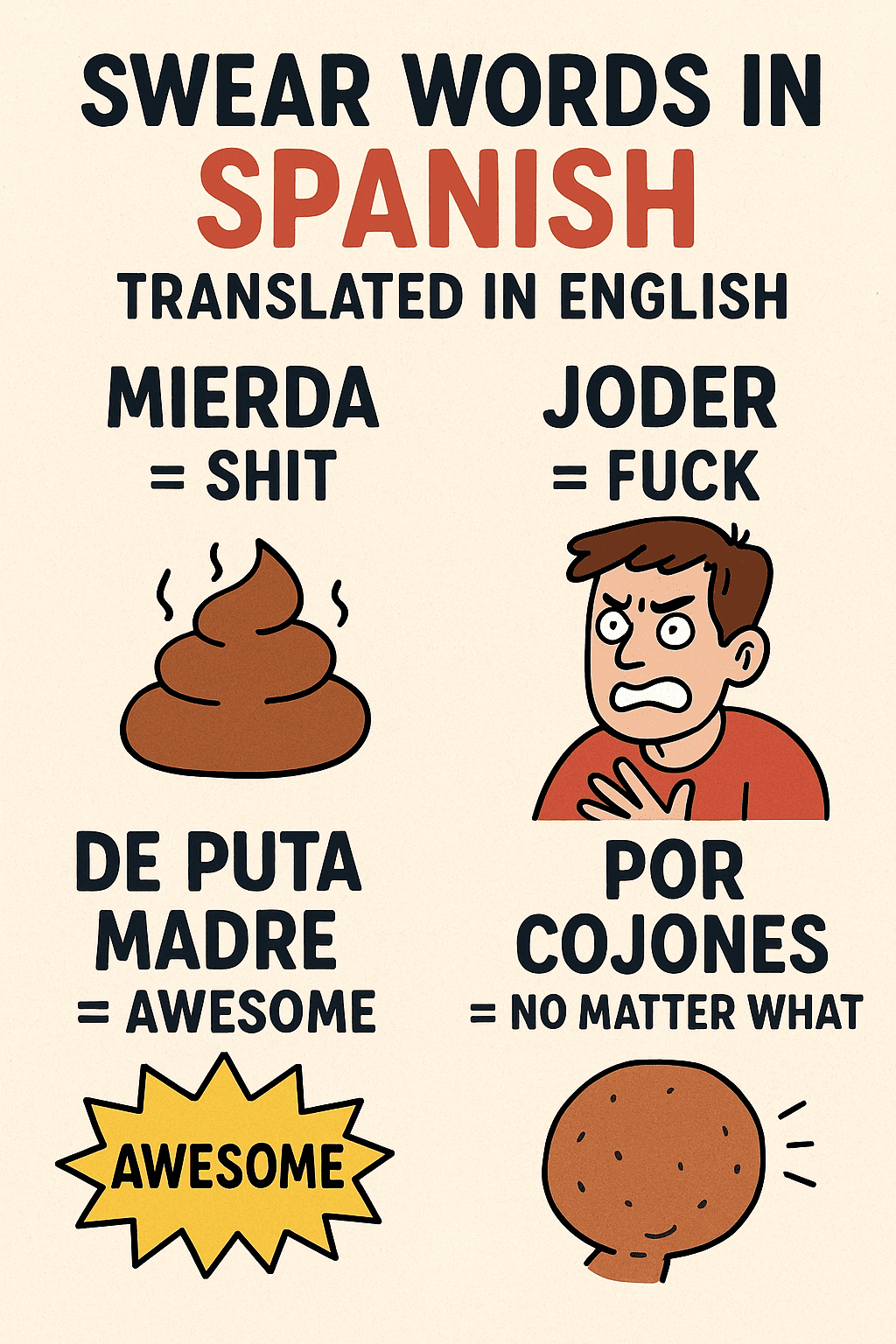
Let’s be honest — everyone gets curious about swear words in Spanish translated in English at some point.
You may have picked them up from your Spanish friends or spotted them in the subtitles of a Spanish movie or series. And you’ve probably wondered: how do these words actually translate into English so you can understand — and maybe even use — them more confidently when speaking Spanish?
That’s exactly what we cover today. After all, learning a few Spanish curse words can be… well, both educational and entertaining 😜.
Why Spanish Swear Words Don’t Translate Perfectly
One of the most confusing things about Spanish curse words translation is that they don’t map neatly onto English. Moreover, each Spanish-speaking country has its own expressions. For example, what sounds mild in Mexico might be shocking in Spain, and vice versa.
Especially, there’s a hard word to translate from English into Spanish: the f word.
If you’re wondering how to say the f word in Spanish, one thing needs to be clarified: English speakers love slapping fucking in front of almost anything to make it emphatic.
- “always the same fucking problem”;
- “this is fucking amazing”;
- “no matter fucking what”.
Spanish has words like puto (or the softer maldito) that can do that job. Therefore, you’ll hear “siempre el mismo puto problema”.
However, Spanish often prefers richer, entirely different constructions rather than sticking a single adjective in front of a noun every time.
For example:
- “this is fucking amazing” in colloquial Spanish can become “esto está de puta madre” → a set phrase where “de puta madre” means awesome or fantastic (not a literal “of the whore mother”).
- “no matter fucking what” wouldn’t normally be translated by adding puto → a very coarse but common equivalent for the sense of “by force / no matter what” is “por cojones”.
The takeaway: while English relies heavily on that one flexible intensifier, Spanish spreads that emphasis across idioms.
So if you want to sound natural (and not accidentally rude), learn the fixed expressions and the register they belong to with this special workshop. If you’re into this topic, you’ll love it!
How Do You Say Swear Words in Spanish?
Previously, we have seen a series of expressions that, rather than insults, are vulgar expressions. Now, I’ll share a few expressions that Spaniards sometimes use to insult someone directly.
Very strong
- hijo de puta — son of a bitch / son of a whore (extremely offensive);
- gilipollas — asshole (common in Spain; vulgar, insulting);
- cabrón — bastard (very strong; can also imply someone is mean or deceitful).
- chupapollas → cocksucker (common in Spain; very vulgar and graphic).
- perra (for women) → bitch (depends heavily on tone and context).
- zorra → slut (can be extremely offensive depending on intent).
Less harsh
- mal nacido — scumbag (insults someone’s character; serious but slightly less crude);
- hijo de tu madre — literally son of your mother (less crude than “hijo de puta”);
- imbécil → idiot (less vulgar, but still quite direct).
- bobo → fool / goofball (soft insult, often teasing).
- tonto → silly / dumb (mild insult).
Spanish Swearing Is an Art Form
Spanish swearing is part of what makes the language alive.
Knowing them doesn’t mean you should use them all the time, but it does help you understand movies, jokes, and real conversations better.
So now that you’ve had a taste of spanish curse words translation, you can appreciate how colorful Spanish really is. Just remember: with great vocabulary comes great responsibility.
